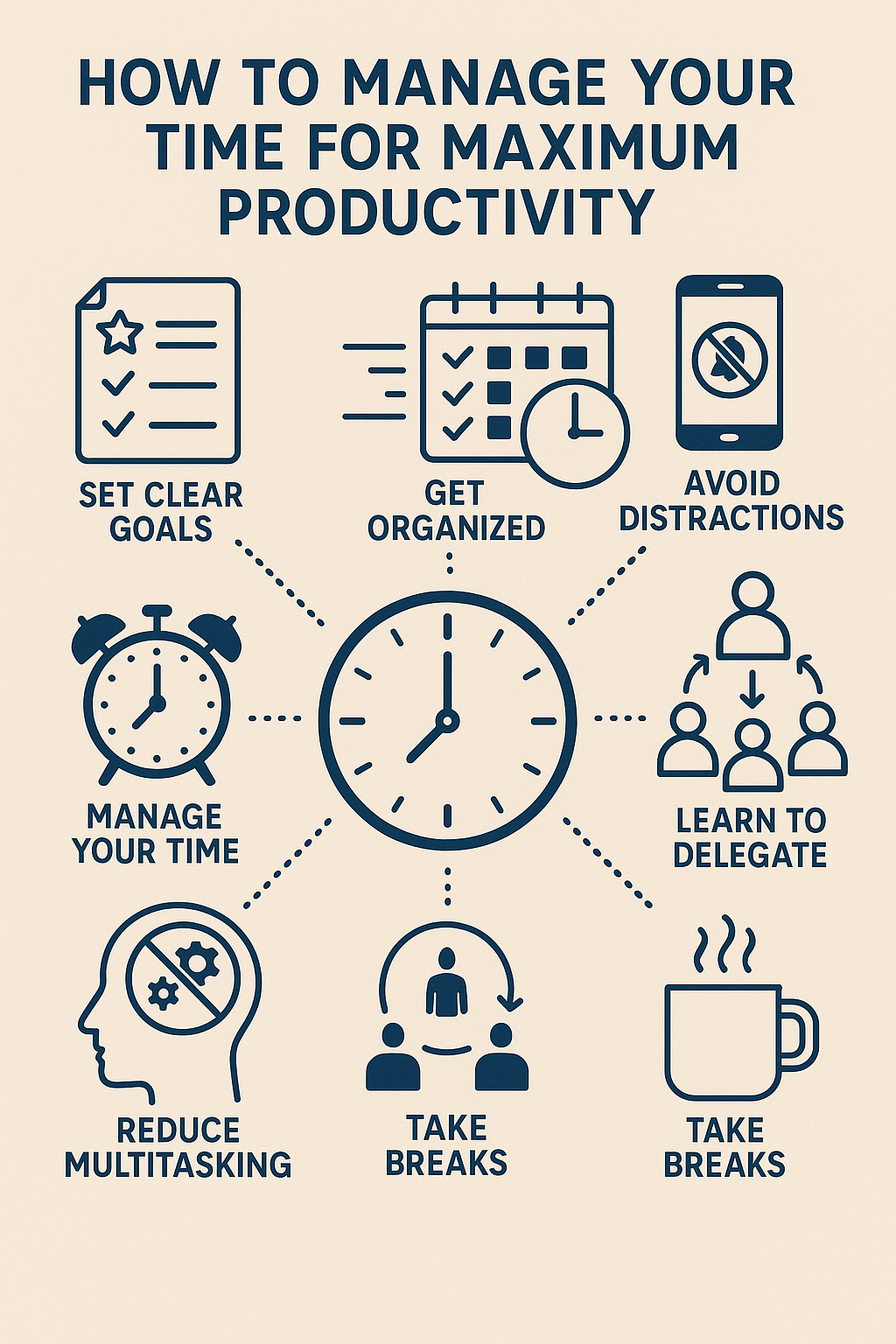Time is one of the most valuable resources we have, yet it often feels like there’s never enough of it. Effective time management is essential for productivity, allowing you to accomplish more in less time while maintaining a balance between work, personal life, and rest. In this article, we’ll explore proven strategies for managing your time efficiently to boost productivity and achieve your goals.
1. Prioritize Your Tasks
One of the most important aspects of time management is knowing which tasks to prioritize. Not all tasks are equally important, and focusing on high-priority tasks ensures that you’re working on what truly matters. Prioritization allows you to be more productive by focusing your energy on tasks that will have the most significant impact on your goals.
Tip: Use the Eisenhower Matrix to categorize tasks based on urgency and importance. Tackle high-priority tasks first and delegate or eliminate tasks that are neither urgent nor important.
2. Break Tasks into Smaller Steps
Large, overwhelming tasks can lead to procrastination and a feeling of being stuck. Breaking these tasks down into smaller, more manageable steps makes them feel less intimidating and more achievable. By completing smaller tasks, you build momentum and make steady progress toward your goal.
Tip: Break down each large task into actionable steps. Instead of saying, “I need to write a report,” break it into smaller steps like “Research the topic,” “Outline the report,” and “Write the introduction.”
3. Use Time Blocking
Time blocking is a time management technique where you allocate specific blocks of time to work on particular tasks or activities. This method helps you stay focused by reducing the temptation to multitask and ensures that you’re dedicating enough time to your most important tasks.
Tip: Use a calendar to block out time for each task or activity. For example, set aside specific time blocks for checking email, working on projects, and taking breaks. Stick to these time blocks as much as possible to stay on track.
4. Avoid Multitasking
While multitasking may seem like a way to get more done, it often leads to decreased productivity and more mistakes. Focusing on one task at a time allows you to give it your full attention and complete it more efficiently. Single-tasking helps you maintain high-quality output while staying focused.
Tip: When working on a task, eliminate distractions and give it your full attention. Avoid switching between tasks until the current one is finished, ensuring that each task is completed thoroughly and effectively.
5. Eliminate Time Wasters
Time wasters, such as social media, unnecessary meetings, or excessive distractions, can eat up your time and reduce productivity. Identifying and eliminating these time-wasting habits is essential for effective time management.
Tip: Identify your biggest time wasters and take steps to eliminate or minimize them. This could mean setting boundaries for social media use, turning off non-urgent notifications, or streamlining unnecessary meetings.
6. Set Specific Deadlines
Setting deadlines, even for tasks that don’t have a set due date, helps create a sense of urgency and keeps you accountable. Deadlines motivate you to take action and finish tasks on time, preventing procrastination and pushing you toward consistent progress.
Tip: Set realistic deadlines for each task and stick to them. If necessary, create interim deadlines for larger projects to ensure steady progress and prevent last-minute rushes.
7. Use a To-Do List or Task Management Tool
Keeping track of your tasks and responsibilities is crucial for staying organized and on top of everything. A to-do list or task management tool helps you visualize your tasks, prioritize them, and check off completed items.
Tip: Use a digital task manager like Trello, Todoist, or Asana to organize your to-do list. Update it regularly to reflect new tasks and changes, and check off completed tasks to maintain a sense of accomplishment.
8. Learn to Delegate
Delegating tasks that others can handle helps free up your time and allows you to focus on your most important responsibilities. Delegation is key to time management, especially when you’re working in a team or have too much on your plate.
Tip: Identify tasks that can be delegated to others and trust them to complete them. Communicate clearly and provide necessary guidance, but give them the freedom to handle the task on their own.
9. Take Regular Breaks
Working for long periods without breaks can lead to burnout and decreased focus. Taking regular breaks throughout the day helps you recharge, improve focus, and prevent mental fatigue. Breaks allow you to come back to your tasks with fresh energy and renewed concentration.
Tip: Follow the Pomodoro Technique or another time management method that includes regular breaks. For example, work for 25 minutes, then take a 5-minute break. After four sessions, take a longer break to refresh your mind.
10. Reflect and Adjust
Effective time management requires ongoing reflection and adjustments. Regularly evaluate how you’re spending your time and identify areas where you can improve. By reviewing your time management strategies and making necessary adjustments, you can continually improve your productivity and work habits.
Tip: At the end of each week, reflect on how well you managed your time. Identify tasks that took longer than expected or areas where you got distracted, and make adjustments to your approach for the upcoming week.
